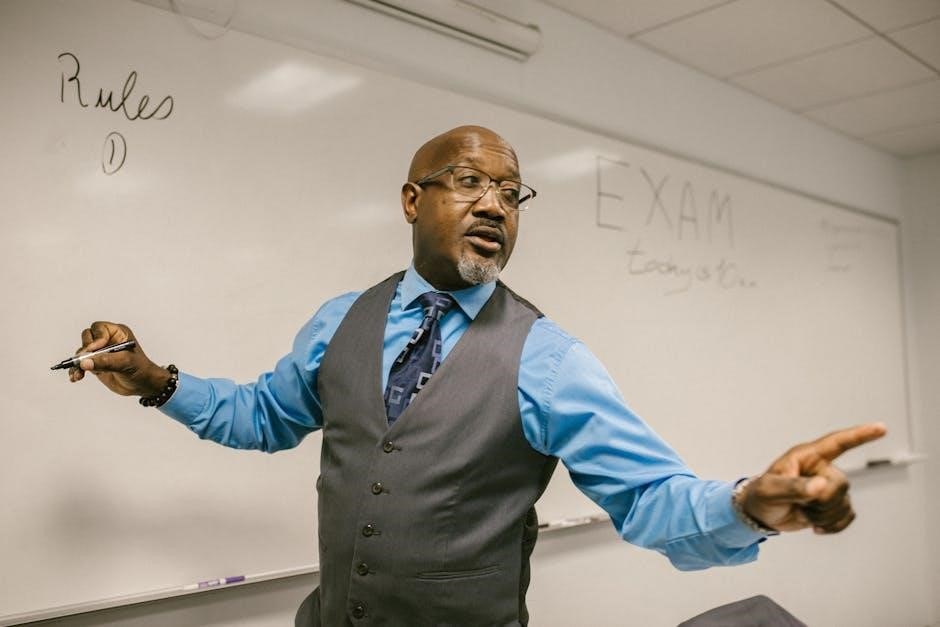The Dean of Instruction is a pivotal academic leader responsible for overseeing curriculum development, ensuring academic quality, and fostering strategic planning․ This role is crucial in aligning instructional goals with institutional missions, ensuring a cohesive and effective educational environment․ The dean collaborates with faculty, students, and stakeholders to promote innovation and excellence in teaching and learning, while addressing challenges such as budget constraints and technological advancements․ Their leadership is essential for maintaining high academic standards and driving institutional success․
1․1 Definition and Overview
The Dean of Instruction is an academic leader responsible for overseeing curriculum development, faculty support, and instructional strategies․ This role ensures the alignment of academic programs with institutional goals, fostering a collaborative environment for teaching and learning․ The dean acts as a visionary, driving educational excellence while addressing faculty and student needs, ensuring high-quality instruction and institutional growth․
1․2 Historical Context and Evolution
The role of the Dean of Instruction has evolved significantly over time, originating from early academic leadership positions․ As higher education expanded, the role became more defined, focusing on curriculum development and faculty support; Today, it emphasizes academic strategy and innovation, ensuring alignment with institutional goals and fostering a collaborative environment for educational excellence․
Key Responsibilities of a Dean of Instruction
The Dean of Instruction oversees curriculum development, manages faculty performance, and ensures academic quality․ They lead strategic initiatives, foster collaboration, and support student success, driving institutional educational goals forward effectively․
2․1 Academic Leadership and Vision
The Dean of Instruction provides academic leadership by shaping the institution’s educational vision and strategy․ They oversee curriculum development, ensure alignment with institutional goals, and collaborate with faculty to drive innovation․ By fostering a culture of excellence, the Dean supports student success and maintains high academic standards, while addressing emerging trends in education to stay ahead in a competitive landscape․
2․2 Curriculum Development and Implementation
The Dean of Instruction oversees curriculum development, ensuring it aligns with institutional goals and meets student needs․ They collaborate with faculty to design and update programs, fostering innovation and relevance․ Effective implementation involves managing timelines, resources, and assessments to ensure academic quality․ The Dean also promotes continuous improvement by evaluating curriculum effectiveness and addressing emerging educational trends to enhance student learning outcomes and success․
2․3 Faculty Management and Support
The Dean of Instruction is responsible for recruiting, evaluating, and supporting faculty to ensure instructional excellence․ They provide professional development opportunities, mentorship programs, and resources to enhance teaching effectiveness․ By fostering a collaborative environment, the Dean helps faculty achieve their full potential, contributing to student success and institutional goals while addressing faculty needs and challenges proactively․

Administrative Duties
The Dean of Instruction oversees operational aspects, such as budget allocation, resource management, and policy adherence, ensuring efficient academic operations and alignment with institutional objectives․
3․1 Budget Management
The Dean of Instruction is responsible for strategic budget allocation, ensuring resources align with academic priorities․ This involves optimizing expenditures, forecasting financial needs, and managing funds to support instructional initiatives․ Effective budget management ensures fiscal sustainability while maintaining high educational standards, requiring careful planning and collaboration with financial officers to allocate resources wisely and address budget constraints․
3․2 Policy Development and Compliance
The Dean of Instruction leads in developing and implementing policies that support academic excellence and institutional goals․ They ensure compliance with regulatory requirements and accreditation standards, collaborating with faculty and staff to align policies with best practices; The dean also oversees audits and reports, addressing compliance gaps and fostering a culture of ethical decision-making to maintain institutional integrity and operational efficiency․

Strategic Planning and Innovation
The Dean of Instruction drives strategic planning and innovation by aligning instructional goals with institutional missions․ They foster a culture of innovation and leverage technology to enhance teaching and learning, ensuring the institution remains competitive and forward-thinking․
4․1 Aligning Instructional Goals with Institutional Mission
The Dean of Instruction ensures instructional goals align with the institution’s mission by overseeing curriculum development, fostering innovation, and promoting academic excellence․ They collaborate with stakeholders to integrate strategic priorities, ensuring all educational initiatives support the institution’s long-term vision and objectives․
4․2 fostering Innovation in Teaching and Learning
4․2 Fostering Innovation in Teaching and Learning
The Dean of Instruction promotes innovative teaching practices by encouraging faculty to integrate technology, adopt new methodologies, and experiment with interdisciplinary approaches․ They support professional development opportunities and foster a culture of experimentation, ensuring that instructional strategies remain forward-thinking and aligned with modern educational trends, ultimately enhancing student engagement and learning outcomes․

Faculty Development and Support
The Dean of Instruction ensures faculty growth by providing professional development opportunities, mentorship programs, and resources to enhance teaching effectiveness, fostering a supportive academic environment for success․
5․1 Professional Growth Opportunities
The Dean of Instruction facilitates professional growth by offering workshops, training sessions, and funding for advanced degrees․ These opportunities enable faculty to stay updated with educational trends, enhancing their teaching methods and academic leadership skills․ Such initiatives foster a culture of continuous improvement, benefiting both faculty and students, while aligning with institutional goals for excellence․
5․2 Mentorship Programs
The Dean of Instruction often establishes mentorship programs to support faculty development․ These programs pair experienced educators with newer staff, fostering knowledge sharing and professional growth․ By creating structured guidance opportunities, the dean helps align individual goals with institutional objectives, promoting a culture of collaboration and innovation within the academic community․

Student Engagement and Success
The Dean of Instruction plays a vital role in enhancing student engagement and success by addressing their needs, fostering inclusive learning environments, and implementing support services to ensure academic achievement and personal growth․
6․1 Enhancing Student Learning Outcomes
The Dean of Instruction focuses on improving student learning outcomes by developing robust curriculum, assessing academic performance, and implementing evidence-based teaching strategies․ They ensure access to resources and support services, fostering an environment that promotes academic success and student satisfaction․ By collaborating with faculty and stakeholders, the dean drives initiatives that enhance engagement, retention, and overall educational quality․
6․2 Addressing Student Needs and Challenges
The Dean of Instruction identifies and addresses student needs by implementing support services and resources to overcome academic and personal challenges․ They foster an inclusive environment, ensuring equity and access for all learners․ By collaborating with faculty and support staff, the dean develops strategies to meet diverse student needs, promoting retention and overall student well-being and success․

Communication and Collaboration
The Dean of Instruction fosters effective communication across departments, ensuring alignment with institutional goals․ Collaboration with faculty, students, and stakeholders is key to creating a cohesive academic environment․
7․1 Interdepartmental Collaboration
The Dean of Instruction ensures seamless interdepartmental collaboration by facilitating open dialogue and shared resources․ This fosters a unified academic strategy, aligns goals, and enhances institutional efficiency, benefiting both students and faculty․
7․2 Community and Stakeholder Engagement
The Dean of Instruction plays a vital role in fostering partnerships with local communities and stakeholders․ By engaging in open communication and collaboration, the dean ensures that the institution’s programs align with community needs and expectations․ This involvement often includes organizing events, seeking feedback, and building relationships to create mutual benefits and support for academic initiatives․

Challenges and Opportunities
The Dean of Instruction faces challenges like budget constraints and evolving educational demands but leverages these as opportunities to innovate and enhance instructional excellence․ By embracing technology and fostering collaboration, the dean can address these challenges while aligning with institutional goals, ultimately driving the institution toward future success and sustainability․
8․1 Navigating Budget Constraints
The Dean of Instruction must skillfully manage financial limitations while ensuring academic excellence․ Strategic prioritization of resources, cost-effective solutions, and innovative funding opportunities are essential․ By aligning budget allocations with institutional goals, the dean can optimize spending to support faculty, curriculum, and student success, even in financially challenging environments․ Fiscal responsibility and creativity are key to sustaining quality education․
8․2 Leveraging Technology for Instructional Excellence
Deans of Instruction leverage technology to enhance teaching and learning․ By integrating digital tools, such as learning management systems and data analytics, they optimize resource allocation and improve student outcomes․ Technology fosters innovation, enabling personalized learning experiences and real-time assessment․ Strategic use of tech tools ensures efficient resource management, supporting faculty innovation and student engagement, while driving instructional advancements․

The Dean’s Role in Accreditation and Assessment
The Dean ensures academic quality through accreditation and assessment․ They lead processes, analyze data, and implement improvements to meet standards and enhance institutional effectiveness continuously․
9․1 Ensuring Academic Quality
The Dean of Instruction ensures academic quality by setting high standards, evaluating program effectiveness, and supporting faculty development․ They monitor curriculum alignment with institutional goals and accrediting requirements, fostering continuous improvement through data-driven decisions and innovative practices to enhance student learning outcomes and institutional reputation․
9․2 Managing Accreditation Processes
The Dean of Instruction oversees accreditation processes, ensuring compliance with regulatory standards and preparing documentation for review․ They coordinate self-study reports, facilitate site visits, and implement feedback to maintain institutional accreditation․ This role involves collaboration with faculty and stakeholders to align programs with accrediting criteria, ensuring academic integrity and continuous improvement․

The Future of Instructional Leadership
The future of instructional leadership involves leveraging technology, fostering equity, and adopting innovative strategies to meet evolving educational needs and global challenges effectively․
10․1 Trends in Instructional Leadership
Emerging trends in instructional leadership emphasize technology integration, data-driven decision-making, and personalized learning․ Deans are increasingly adopting innovative strategies to enhance student outcomes, foster equity, and prepare for future challenges․ The role is evolving to prioritize leadership development, collaboration, and adaptability in response to changing educational landscapes and societal demands for accessible, high-quality instruction․
10․2 Preparing for Future Challenges
Deans must anticipate and address future challenges such as shifting student needs, technological advancements, and evolving workforce demands․ Proactive strategies include investing in professional development, fostering innovation, and building resilient infrastructure․ By staying ahead of trends and collaborating with stakeholders, deans can ensure their institutions remain competitive and continue to deliver high-quality education in an ever-changing world․



